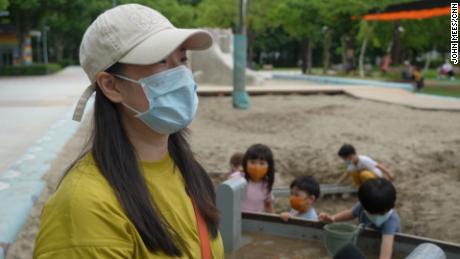With eye on China’s zero-Covid chaos, Taiwan seizes chance to open up

The tables at his diner in the Taiwanese capital are buzzing with customers, waiters bustle with dishes of squid soup and rice noodles, and talk and laughter fills the air.Chen considers himself lucky. Taiwan is allowing restaurants like his to remain open despite a wave of Covid infections — hitting more than 60,000 cases on Thursday alone — sweeping through the island. Things might have been so different. Until recently the island had taken a zero-tolerance approach to the virus: Chen’s business was shut for more than two months during the last major outbreak in May 2021, dealing a blow to his employees — and his bottom line — that left him “heartbroken.” “We were lucky to have survived and moved on from it,” he said.But since then, the Taiwanese government has had a profound rethink. What was until recently one of the world’s last zero-Covid holdouts has now switched its mindset to living with the virus — prompted by the realization that even the toughest contact-tracing and quarantine regimes are no match for the highly transmissible Omicron variant, as demonstrated by the chaos playing out across the Taiwan Strait in China For Chen, it’s a welcome shift that has ensured his business can continue relatively unaffected by the outbreak. While he remains concerned about the virus, he believes the best approach is to learn from other east Asian economies — such as Singapore — that have managed to navigate similar changes in mindset. “I think we need to overcome our fears, and tread carefully step by step,” he said. Skepticism remains Still, not everyone is convinced Taiwan is fully prepared to move on. Since the beginning of May, as case numbers spiked, long queues have formed in front of pharmacies across Taipei daily as residents scramble to purchase rapid test kits. Many leave empty handed despite queuing for hours. The Health Ministry has said those without Covid-19 symptoms must first test positive on a rapid test if they are to be eligible for a more accurate PCR test, which has only heightened demand. The difficulty of purchasing the test kits has prompted some residents to complain about the authorities’ lack of preparedness. “It would have been better for residents to (be prepared) before we moved towards living with the virus,” said a mother surnamed Hsueh, who has a 3-year-old boy. “Many families still do not have adequate access to rapid test kits.” Other parents fear their children, who are still not eligible for vaccination in Taiwan, are vulnerable. “I feel like the government has not considered children in their move toward living with the virus,” said another mother surnamed Chang, whose two children are in kindergarten. “I am worried… I have avoided taking my children to indoor playgrounds, and I only take them to parks when there are fewer people.” “Right now, there are changes to the rules every day or two,” Hsueh said. “It can be really confusing, and it is better to have a plan.” CNN’s John Mees contributed reporting





